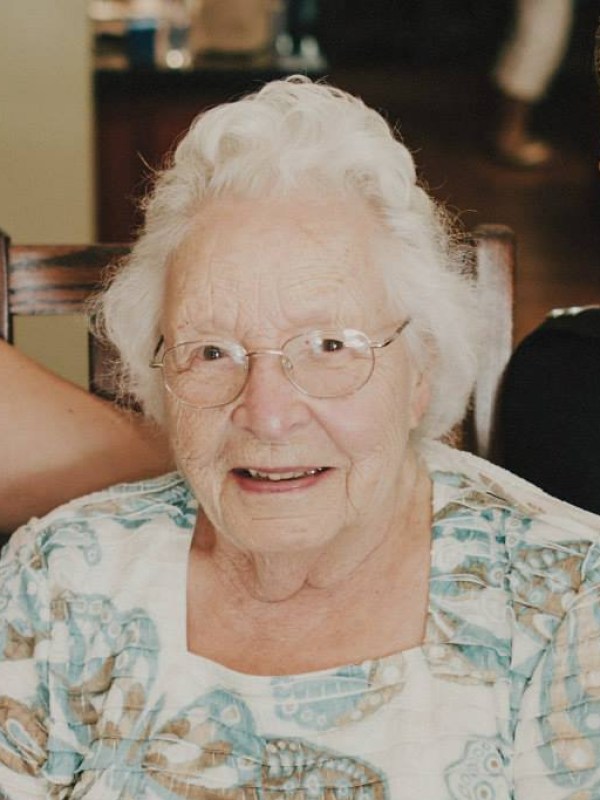Dorris West Goodrich
Dorris West Goodrich, long-time Santa Barbara resident, passed away peacefully on October 22, 2021, at the age of 101. She was known for her creativity, kindness, enthusiasm, empathy, sense of humor, and inter-generational friendships…and for earning her PhD five years before her late husband of 67 years, UCSB China scholar and California native Chauncey S. Goodrich, Jr., even while rearing the first two of their four children.
Dorris was born on February 3, 1920, in Palouse, Washington, a farming town near the Idaho border, and at home (above a car-repair business) because the local hospital was full of influenza patients. She was not destined agricultural life, however, like her Uncle Clayton, nor did she follow her parents’ commercial pursuits — they ran the town’s West’s Grocery for many decades. After graduating from high school in 1937 she attended business school, as had her father, learning shorthand, accounting, and legal stenography. She used those skills to pay her way through Washington State University in Pullman (at 35 cents per hour for secretarial services). She majored in sociology, and graduated in 1942.
World War Two caused a shortage of college teachers, and for graduate school Dorris accepted the best offer — a half-time teaching position, at $600 per year, at the University of Minnesota. Her mentor there was editor of the American Sociological Review, and she became his assistant. She also ushered for the Minneapolis Symphony, where she once chatted with the great baritone, activist, and fellow Phi Beta Kappan, Paul Robeson. More significantly, in Minneapolis she met Chauncey, introduced by Robert Heilbroner, the economic historian and lifelong friend who would soon write the million-selling “The Worldly Philosophers.” Chauncey was then in the Army, having been trained as an interpreter of Japanese. He and Dorris married in 1945, but within months Chauncey was deployed overseas. Dorris soon found she was pregnant, and returned home to Palouse to have baby Anne. Fortunately, the Armistice was signed before Chauncey reached Japan, though he wouldn’t return to the U.S. and see Anne until she was six months old.
Dorris would bear three more children while her husband worked on his doctorate at U.C. Berkeley. She finished her own in 1952 — the first PhD awarded to a woman by the sociology department. Dorris had no qualms about giving up a career for motherhood, however, later saying she predated “feminism” and had zero regrets. Her academic accomplishments, while compressed into just a few years, have remained relevant. In 2017, she was contacted by a student in India hoping to access a copy of her dissertation, on Anglo-Indians as an ethnic group (son David made sure the dissertation, within weeks, was published online and made freely available); in 2019, an article Dorris published in 1945 was cited by a modern researcher as perhaps the first essay describing how an academic journal decides which articles to print — revealing, wrote the researcher, “what goes on behind the curtain.”
Dorris was, in brief, ahead of her (scholastic) time, but her deepest impact was on family and friends. While she often played the “trailing spouse,” as when Chauncey, in 1960, took a three-year position at Cambridge University, or, in 1968, traveled to Taiwan on sabbatical to do research, Dorris did more than adapt. She wrote a book, never published, on the British education system, improved her mahjong skills (like Anne, she was famously good at Scrabble), cooked on a Chinese gas grill, and was much praised and appreciated for her long, detailed letters. Her correspondence, perfectly typed and proofread, is notable for its clarity, volume, and empathy.
Throughout her life Dorris was heavily involved in high-level crafting, from professional-quality embroidering, to polished-rock mosaics, to the paper-applique decorative arts. Her fascination with psychology bloomed in her later years with an interest in C.G. Jung’s work, kindled by Chauncey’s parents’ friendship with, and analysis by, the great psychologist in Zurich in the 1920s. But Dorris never sat still, intellectually; in her 70s and 80s she researched and wrote a heavily illustrated book, also unpublished, on “The Annunciation,” tracing how this Christian image has changed across the centuries.
Dorris surprised everyone by thriving after the death of Chauncey, at 93, in 2013. She had many visitors at her room in Valle Verde, both in person and by phone; she had mentored peers and young people for more than half a century, some of them living in the Goodrich home for months at a time. International visitors were also frequent, due to Chauncey’s Chinese scholarship and the friends the couple met during international vacations or while overseeing college students through UCSB’s Education Abroad program. Many analysts and psychologists (including former daughter-in-law Cheryl Yund Goodrich, an adopted child in all but name) also visited while passing through Santa Barbara.
The great happiness of Dorris’ last years, however, was getting acquainted with the family of an older sister given up for adoption by her parents in 1918. Eileen not only survived into her 90s, but thrived — and not only closely resembled Dorris, but led a parallel life by likewise earning Phi Beta Kappa honors, going into education, getting an advanced degree, and writing books. Tracked down by K. Eileen Allen’s descendants, Dorris discovered that her late sister’s grandson lived only a few miles away, in Hope Ranch, a coincidence that led to an unexpected family reunion about which Dorris, then 99, would talk, with unrestrained delight, for many months. A circle had been closed, for Eileen’s side of the family as well as Dorris’, in a fitting capstone to a well-lived life.
Dorris is survived by her four children, Anne, David, John, and Chris, 10 grandchildren, 9 great-grandchildren, numerous nieces and nephews, including Nancy West Gonzalez of Orcutt, and the “new family” mentioned above. Her belief in education suggests she would happily be memorialized through contributions in her name to state university scholarship funds.

